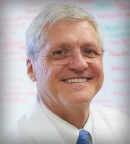Mark G. Kris, MD, FASCO, Chief of the Thoracic Oncology Service and the William and Joy Ruane Chair in Thoracic Oncology at Memorial Sloan Kettering Cancer Center, New York, commented on the excitement in the field of lung cancer about the new drugs targeting KRAS. Sotorasib is one of several new KRAS inhibitors in development, he noted, and it is the farthest along.
“For many years, KRAS has represented the definition of an undruggable target. There is no good answer about why it took so long to develop a drug to target KRAS that can be used clinically. KRAS is the most common mutation in lung adenocarcinoma, and it is the major mutation for which we have developed therapies,” Dr. Kris said in an interview with The ASCO Post.
“We have spent decades trying to find a drug that is specific to this target. The biology is complex and not straightforward like a kinase inhibitor. Through the persistent work of a number of scientists, this class of drug has now come forward,” Dr. Kris noted. “Two others are close behind sotorasib—adagrasib and GDC-6036—and more are in the pipeline.”

Mark G. Kris, MD, FASCO
Identifiable Targets
“Having a KRAS inhibitor is tremendously important therapy for people with lung cancers. Moreover, it is part of [the panel for] next-generation sequencing used for many tumor types, and it is an identifiable target. KRAS also appears on other tumors. Having medicines to help patients with this specific abnormality is a great benefit,” Dr. Kris stated.
“When you do next-generation sequencing, you can now find this target. When you add up all the targeted mutations in lung cancer [ie, ALK, RET, EGFR, MET exon 14 skipping, KRAS], they account for about 50% of all lung cancers,” he explained.
Dr. Kris noted there is no alternative to a KRAS inhibitor. “You could compare this miracle to the COVID vaccine. There are multiple vaccines and there will be multiple KRAS inhibitors to help fight against lung cancer. Multiple drugs that work on KRAS are marching toward approval by the U.S. Food and Drug Administration and will open the door to better care,” Dr. Kris concluded.
DISCLOSURE: Dr. Kris has served as a consultant or advisor to AstraZeneca, Daiichi Sankyo, Genentech/Roche, Novartis, Pfizer, and Sanofi/Aventis; has been reimbursed for travel, accommodations, or other expenses by AstraZeneca, Daiichi Sankyo, Genentech, and Pfizer; and has held other relationships with Genentech/Roche and Memorial Sloan Kettering Cancer Center.

